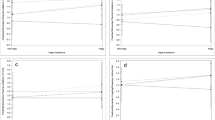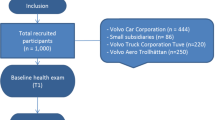Abstract
To examine the relationships between anger expression and blood pressure (BP) levels and their effect modification by stress coping behaviors, the authors analyzed data from a cross-sectional study of 790 Japanese male workers aged 20–60 years. We used the Spielberger anger expression scales to measure anger-out, anger-in, and anger-control. Relationships between anger expression scales and mean systolic and diastolic BP levels were examined in the total sample and in two subgroups of high and low stress coping behaviors (low coping behavior group: having none, one, or two coping behaviors; and high coping behavior group: having three or more coping behaviors). Anger expression scales were not associated with BP levels in the total sample. Among men who reported only two or fewer coping behaviors, however, the anger-out score was significandy associated with systolic blood pressure (SBP) levels while no association was found among men who reported the larger number of coping behaviors. Anger-in and anger-control were not associated with BP levels in either low or high coping behavior groups. This study suggests that male workers who do not express their anger have a higher probability of developing high BP when they have no or few stress coping behaviors.
Similar content being viewed by others
References
Tanaka H, Ueda Y, Hayashi M, et al. Risk factors for cerebral hemorrhage and cerebral infarction in a Japanese rural Community. Stroke 1982; 13: 62–72.
Sankai T, Iso H, Shimamoto T, et al. A nested case-control study of risk factors for intracerebral hemorrhage and cerebral infarction classified by computed tomographic findings (in Japanese with English abstract). Jpn J Public Health 1992; 39:410–20.
Kahn HA, Medalie JH, Neufeld HN, Riss E, Goldbourt U. The incidence of hypertension and associated factors: The Israel ischemic heart disase study. Am Heart J 1972; 84: 171–82.
Intersalt Cooperative Research Group. Intersalt: An international study of electrolyte excretion and blood pressure. Results for 24 hour urinary sodium and potassium excretion. BMJ 1988; 297: 319–28.
Ford ES, Cooper RS. Risk factors for hypertension in a national cohort study. Hypertension 1991; 18: 598–606.
Shimamoto T, Komachi Y, Inada H, et al. Trends for coronary heart disease and stroke and their risk factors in Japan. Circulation 1989; 79: 503–15.
The Ministry of Labor. Survey on state of employee’s health (in Japanese). 1992; 35–49.
Alexander F. Emotional factors in essential hypertension. Pyschosom Med 1939; 1: 175–79.
Harburg E, Chape JC, Hauenstein LS, Schull WJ, Schork MA. Socio-ecological stress, suppressed hostility, skin color, and black-white male blood pressure. Detroit. Psychosom Med 1973; 35: 276–96.
Esler M, Julius S, Zweifler A, et al. Mild high-renin essential hypertension. Neurogenic human hypertension? N Engl J Med 1977; 296: 405–11.
Julius M, Harburg E, Cottington E, Johenson E. Anger- coping types, blood pressure, and all-cause mortality: a follow-up in tecumseh, Michigan (1971-1983). Am J Epidemiol 1986; 124: 220–33.
Johnson EH, Schork NJ, Spielberger CD. Emotional and familial determinants of elevated blood pressure in black and white adolescent females. J Psychosom Res 1987; 31: 731–41.
Johnson EH, Spielberger CD, Worden TJ, Jacobs GA. Emotional and familial determinants of elevated blood pressure in black and white adolescent males. J Psychosom Res 1987; 31: 287–300.
Harburg E, Gleiberman L, Russell M, Cooper ML. Anger- coping styles and blood pressure in black and white males: Buffalo, New York. Psychosom Med 1991:53:153–64.
Steele MS, McGarvey ST. Anger expression, age, and blood pressure in modernizing Samoan adults. Psychosom Med 1997; 59: 632–7.
Markovitz JH, Matthews KA, Kannel WB, Cobb JL, D’Agostino RB. Psychological predictors of hypertension in the Framingham Study. Is there tension in hypertension? JAMA 1993; 270: 2439–43.
Jonas BS, Franks P, Ingram DD. Are symptoms of anxiety and depression risk factors for hypertension? Longitudinal evidence from the National Health and Nutrition Examination Survey I. Epidemiologic follow-up study. Arch Fam Med 1997; 6: 43–9.
Jamner LD, Shapiro D, Goldstein IB, Hug R. Ambulatory blood pressure and heart rate in paramedics: effects of cynical hostility and defensiveness. Psychosom Med 1991; 53: 393–406.
Mann SJ, James GD. Deffensiveness and essential hypertension. J Psychosom Res 1998; 45: 139–48.
Schnall PL, Schwartz JE, Landsbergis PA, Warren K, Pickering TG. Relation between job strain, alcohol, and ambulatory blood pressure. Hypertension 1992; 19: 488–94.
Lindquist TL, Beilin LJ, Knuiman MW. Influence of lifestyle, coping, and job stress on blood pressure in men and women. Hypertension 1997; 29: 1–7.
Nakagawa Y, Takabayashi H, Takahashi S, Tatara K. The relationship between stress and health indicators in an urban population-from a study of subjects selected by sex and age groups who underwent health check-ups in S city in Osaka prefecture- (in Japanese with English abstract). Jpn J Hyg 1998; 53: 407–19.
Kawakami N, Haratani T, Araki S. Job strain and arterial blood pressure, serum cholesterol, and smoking as risk factors for coronary heart disease in Japan. Int Arch Occup Environ Health 1998; 71: 429–32.
James GD, Yee LS, Harshfield GA, Blank SG, Pickering TG. The influence of happiness, anger, and anxiety on the blood pressure of borderline hypertensives. Psychosom Med 19860; 48: 502–8.
Sinha R, Lovallo WR, Parsons OA. Cardiovascular differentiation of emotions. Psychosom Med 1992; 54: 422–35.
Kaga T. Passive-aggressive type personality (in Japanese). In: Hara T, Kano T, editors.Kougekisei (agression). Tokyo; Iwasaki press, 1979: 51–76.
Matsushima T, Michiba N, Hinohara S, Williams RB Jr, Shinoda T. Studies on type A behavior pattern and hostility in Japanese male subjects with special reference to CHD (in Japanese with English abstract). Shinshin-Igaku 1983; 23: 321–8.
Kamarck TW, Manuck SB, Jennings JR. Social support reduces cardiovascular reactivity to psychological challenge: a laboratory model. Psychosom Med 1990; 52: 42–58.
Gerin W, Pieper C, Levy R, Pickering TG. Social support in social interaction: a moderator of cardiovasucular reactivity. Psychosom Med 1992; 54: 324–36.
Spielberger CD, Johnson EH, Russell SF, Crane RH, Worden TJ. The experience and expression of anger: construction and validation of an anger expression scale. In: Chesney MA, Rosenman RH, editors. Anger and hostility in cardiovascular and behavioral disorders. New York, Hemisphere/McGraw Hill, 1985: 5–30.
Spielberger CD. Manual for the State-Trait Anger Expression Scale (STAX). Odessa, FL, Psychological Assessment Resources, Inc., 1988.
Suzuki T, Haruki Y. The relationship between anger and circulatory disease (in Japanese with Engilsh abstract). Jpn J Health Psychol 1994; 7: 1–13.
Saito Y. The study of stress coping behavior among Japanese employee (in Japanese). An epidemiological survey on work stress and health in various kinds of occupations of Japan, second report 1993; 41–53.
Carver CS, Scheier MF, Weintraub JK. Assessing coping strategies: a theoretically based approach. J Pers Soc Psychol 1989; 56: 267–83.
Armstead CA, Lawler KA, Gorden G, Cross J, Gibbons J. Relationship of racial Stressors to blood pressure responses and anger expression in black college students. Health Psychol 1989; 8: 541–56.
Matthews KA, Woodall KL, Allen MT. Cardiovascular reactivity to stress predicts future blood pressure status. Hypertension 1993; 22: 479–85.
Author information
Authors and Affiliations
Corresponding author
Rights and permissions
About this article
Cite this article
Ohira, T., Tanigawa, T., Iso, H. et al. Impact of anger expression on blood pressure levels in white-color workers with low-coping behavior. Environ Health Prev Med 5, 37–42 (2000). https://doi.org/10.1007/BF02935914
Received:
Accepted:
Issue Date:
DOI: https://doi.org/10.1007/BF02935914




